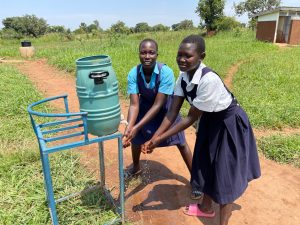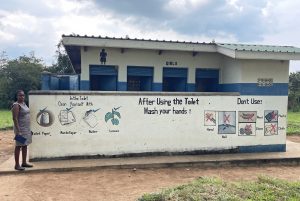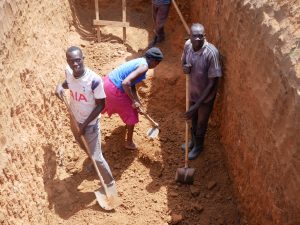ADVOCACYNET 407, May 13, 2024
Toilets Boost the Enrollment of Girls in Ugandan Schools
By the spring of 2023, Robert Abala Okello, head teacher at the Panykworo Primary School in Gulu District, Uganda, had become deeply frustrated by the abysmal state of girls’ toilets at his school, many of which lacked doors.
Mr Okello had forbidden girl students from using the derelict toilets. But the girls would sneak past teachers and use them anyway to avoid going home to relieve themselves. Some girls had even dropped out of school altogether.
As a past winner of the Uganda Teacher of the Year award, Mr Okello understood that this did not reflect well on his school. So he was quick to accept an offer from the Gulu Disabled Persons Union, a prominent advocate for disability and education, to install WASH (Water, Sanitation and Hygiene) at his school. GDPU has partnered with The Advocacy Project (AP) since 2008.
GDPU handed over the new toilets to the Panykworo community on July 31 last year to whoops of joy from families and school staff. Susan, a grandmother who had helped to dig the latrine pit, said that the six days of hard work had been worth the effort. “We love our school and our children!”
Another parent digger, Emmanuel, expressed hope that the new toilets would boost enrollment at Panykworo. He had good reason to be optimistic. When Principal Okello did a count of students at the start of this school year, he found that the number of girls had increased to 560 from 526 in 2023, promising a significant boost to his school’s income and prestige.
Mr Okello told Emma Ajok, who manages the WASH project for GDPU, that the new toilets were largely responsible.
*
GDPU’s WASH program is a response to a crisis that would be unthinkable in American or European schools but is front and center in much of Uganda.
One reason, said Cesar Akena, the Gulu District Education Officer, is that primary education is mandatory in Uganda. But schools cannot cope with the numbers and are severely under-funded. The government requires one toilet stance for every 40 students, but in many schools the ratio is over one to 100.
This is particularly dire for girls during menstruation, said Mr Akena. “Many girls are afraid to come to school because there are no changing rooms. They prefer to stay at home.”
GDPU’s program began in 2014 after a survey of schools found crumbling structures, overflowing toilets, empty water tanks, stolen gutters and indifferent parents. Donors rarely returned to check on the condition of toilets they had funded.
Ms Ajok said that GDPU starts every new project by asking parents like Susan and Emmanuel at Panykworo to dig the latrine pit so they will “own the new toilets and keep them clean.”
GDPU focuses exclusively on girl students and the package this year will include changing rooms, incinerators to dispose of used sanitary pads and trainings in personal hygiene and malaria prevention. “We are constantly learning new lessons and making improvements,” said Ms Ajok.
Monitoring and follow-up is another priority for 2024. GDPU and AP visited several schools last summer and found that while many structures are sound, the toilets themselves are often left filthy.
One school, in the community of Abaka, had received new toilets from a prominent Western NGO in 2022, yet the walls were black with mosquitoes – in spite of the risk from malaria. After Ms Ajok learned that the toilets were only cleaned every three days, she sternly admonished the head teacher. When she returned two days later the walls were clean.
This year Ms Ajok plans to visit 15 schools and help teachers create cleaning rosters. She will also offer them GDPU’s own brand of liquid soap, Clean Wash, at a reduced rate. GDPU began making the soap during the pandemic with funds from AP.
This focus on monitoring and maintenance drew praise from Mr Akena, the District Education Officer, who oversees all 47 primary schools in the district and is an enthusiastic supporter of GDPU’s community-based approach.
“Cleaning toilets does not require a lot of money because we have water in the schools,” he said. “I’m going to take it up with school administrators and make sure they do their duty.”
*
This year GDPU plans to monitor the 15 schools and install WASH at Kulu Opal, a school that is still using toilets built by Japanese aid in 2008. Kulu Opal will be the seventh school to receive a WASH package since 2015.
AP has raised over $63,000 for the program from the donors listed below, who have included several Peace Fellows. This year’s Fellow, Julia Davatzes, is a graduate student at George Washington University and has a background in environmental engineering.
In addition to raising funds, AP is hoping to find Rotary clubs in the US to partner with the Gulu City Rotary Club, which supports GDPU’s WASH program. The North Kingstown Rotary Club (RI) has donated since 2019.
The online giving market place Givology has also supported the program and will organize a virtual meeting between high school students in the US and Ms Ajok at GDPU next month.
Our thanks to friends who have donated to this program: The Prince of Peace Lutheran Church (Dublin; OH); Water Charity; Givology; The Rotary Club of North Kingstown, (RI); World Connect; GlobalGiving donors; Peace Fellows Rebecca Scherpelz, John Steies, Josh Levy and Chris Markomanolakis.




